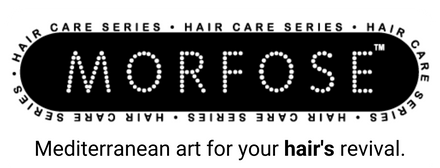How to Maintain Healthy Hair During and After Pregnancy
Posted by MORFOSE COSMETICS

Nurturing Your Hair During Pregnancy
Congratulations on this incredible journey of motherhood! Pregnancy is a remarkable time filled with anticipation and joy. While you're preparing for your baby's arrival, it's also essential to care for yourself, and that includes taking care of your hair. During pregnancy, your body undergoes various changes, some of which can affect the health and appearance of your hair. In this guide, we'll explore how to nurture your hair during pregnancy, ensuring it remains healthy and beautiful.
Nutritional Support for Healthy Hair While Pregnant
Your diet plays a vital role in the health of your hair. During pregnancy, your body's nutritional needs increase, and certain vitamins and minerals are particularly important for your hair. Here's what you can do to support your hair from within:
- Prenatal Vitamins: Check with your healthcare provider for a prenatal vitamin that includes essential nutrients like biotin, folic acid, and iron, which promote hair health.
- Balanced Diet: Consume a well-rounded diet rich in fruits, vegetables, lean proteins, and whole grains to ensure you're getting a variety of nutrients.
- Hydration: Stay well-hydrated. Drinking plenty of water not only benefits your overall health but also contributes to hair health.
Safe Hair Care Practices During Pregnancy
While you might need to adjust your hair care routine during pregnancy, you can still maintain healthy and beautiful hair with safe practices. Here's how:
- Use Pregnancy-Safe Products: Some hair care products contain chemicals that may not be safe during pregnancy. Opt for shampoos, conditioners, and styling products labeled as pregnancy-safe or free from harmful ingredients like sulfates and parabens.
- Avoid Excessive Heat: High heat from hair dryers and straighteners can cause hair damage. Whenever possible, let your hair air dry or use these tools on the lowest heat setting.
- Gentle Styling: Be mindful when pulling your hair into tight hairstyles. Avoid styles that cause stress on your scalp and hair follicles.
Dealing with Pregnancy-Related Hair Changes
It's common for women to experience changes in their hair during pregnancy, which can be temporary or more long-lasting. Here are some common hair changes and how to deal with them:
- Thicker Hair: Some women experience thicker hair due to hormonal changes. Enjoy this extra volume and consider hairstyles that take advantage of the added thickness.
- Hair Growth: You might notice more hair growth in areas you didn't expect, such as your face or body. This is also due to hormonal changes. If you're uncomfortable with the excess hair, consult with a dermatologist or professional for safe hair removal options.
- Hair Loss After Pregnancy: Many women experience hair shedding in the months following childbirth. This is often a temporary condition known as telogen effluvium. Be patient, as your hair should gradually return to its normal state. Maintain a healthy diet and hair care routine to support regrowth.
In conclusion, nurturing your hair during pregnancy involves ensuring you receive the necessary nutrients, practicing safe hair care, and understanding and managing any hair changes. Pregnancy is a unique and beautiful journey, and with the right care, your hair can continue to shine throughout this special time.

Post-Pregnancy Hair Care Tips
Bringing your precious little one into the world is a beautiful and transformative experience. During pregnancy, your body undergoes numerous changes, some of which affect your hair. While the thick and lustrous hair you might have enjoyed during pregnancy is wonderful, it's not uncommon for new moms to experience post-pregnancy hair changes. In this guide, we'll explore what you can expect during the postpartum period and offer hair care tips to keep your locks looking their best.
Postpartum Hair Recovery: What to Expect
Postpartum hair recovery is a unique journey, and it's helpful to know what to expect:
- Hair Shedding: Many new moms experience hair shedding, known as telogen effluvium, a few months after childbirth. This happens because hair follicles return to their normal growth cycle after being in the "resting" phase during pregnancy. While it might be concerning, this shedding is usually temporary, and your hair should gradually regain its fullness.
- Texture Changes: Some women notice changes in their hair texture. Hair that was once straight may become wavy, or vice versa. These changes are often due to hormonal fluctuations and should stabilize over time.
- Reduced Hair Loss: For those who experienced thicker hair during pregnancy, it's common for hair to return to its pre-pregnancy state after a few months.
Hair Care for New Moms: Simple and Effective Practices
As a new mom, you're likely adjusting to a whole new routine filled with baby care and sleepless nights. Here are some straightforward yet effective hair care practices that can help you maintain healthy and beautiful hair while adapting to your new role:
- Pregnancy-Safe Products: If you've been using pregnancy-safe products, continue with them to ensure your hair care routine remains gentle and nurturing.
- Hydration and Nutrition: Staying well-hydrated and maintaining a balanced diet benefits not only your overall health but also the health of your hair. Your body's nutritional needs continue while breastfeeding.
- Low-Maintenance Styles: Embrace low-maintenance hairstyles that don't require excessive styling. A simple and chic bob or a ponytail can keep you looking stylish with minimal effort.
- Scalp Health: Pay attention to your scalp's health by keeping it clean and well-moisturized. Gentle scalp massages can promote blood flow and support hair growth.
Seeking Professional Help for Post-Pregnancy Hair Concerns
If you're experiencing significant post-pregnancy hair concerns, it's advisable to consult with a healthcare professional or dermatologist. They can offer personalized guidance and treatments if necessary. Some potential concerns might include:
-
Persistent Hair Shedding: If your hair loss continues or appears excessive, professional evaluation can help rule out other potential causes.
- Scalp Conditions: Postpartum changes might sometimes lead to scalp issues. A dermatologist can diagnose and treat conditions like postpartum alopecia or scalp dermatitis.
- Texture Changes: If you've noticed persistent texture changes in your hair that concern you, a dermatologist or hairstylist can provide guidance on managing these changes.
Remember, your post-pregnancy hair journey is a part of your unique postpartum experience. With a gentle and patient approach, it's possible to maintain healthy and beautiful hair during this transformative time in your life. Congratulations on your new bundle of joy!



